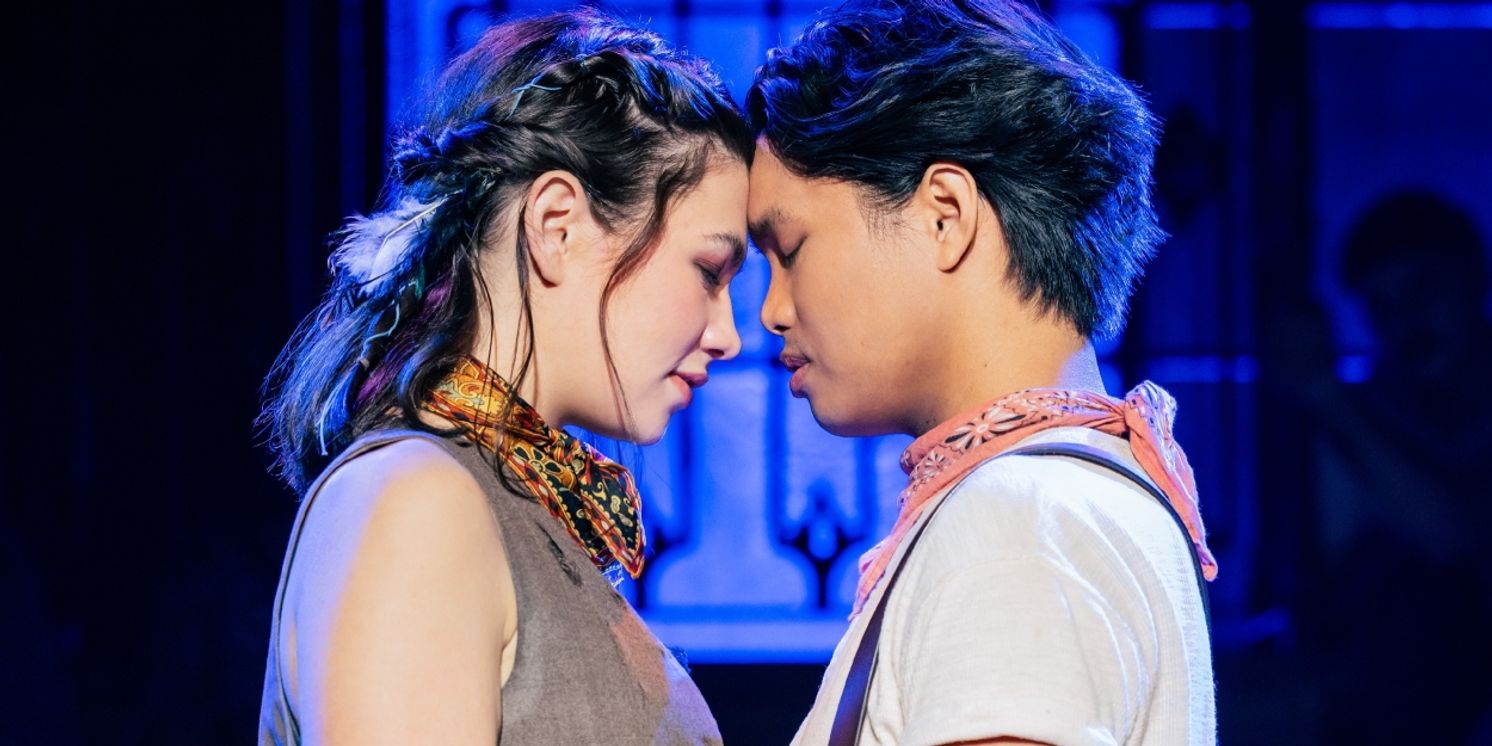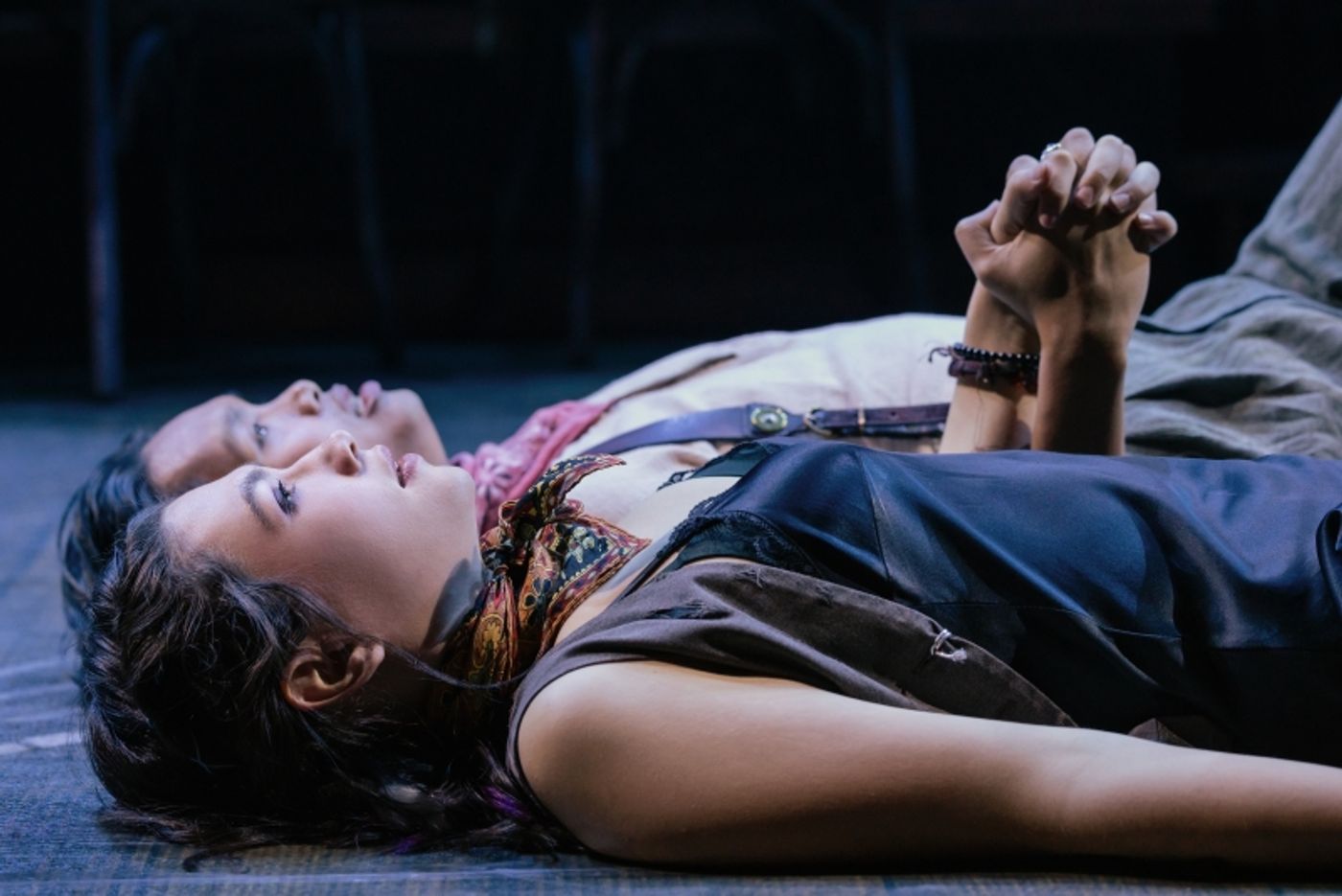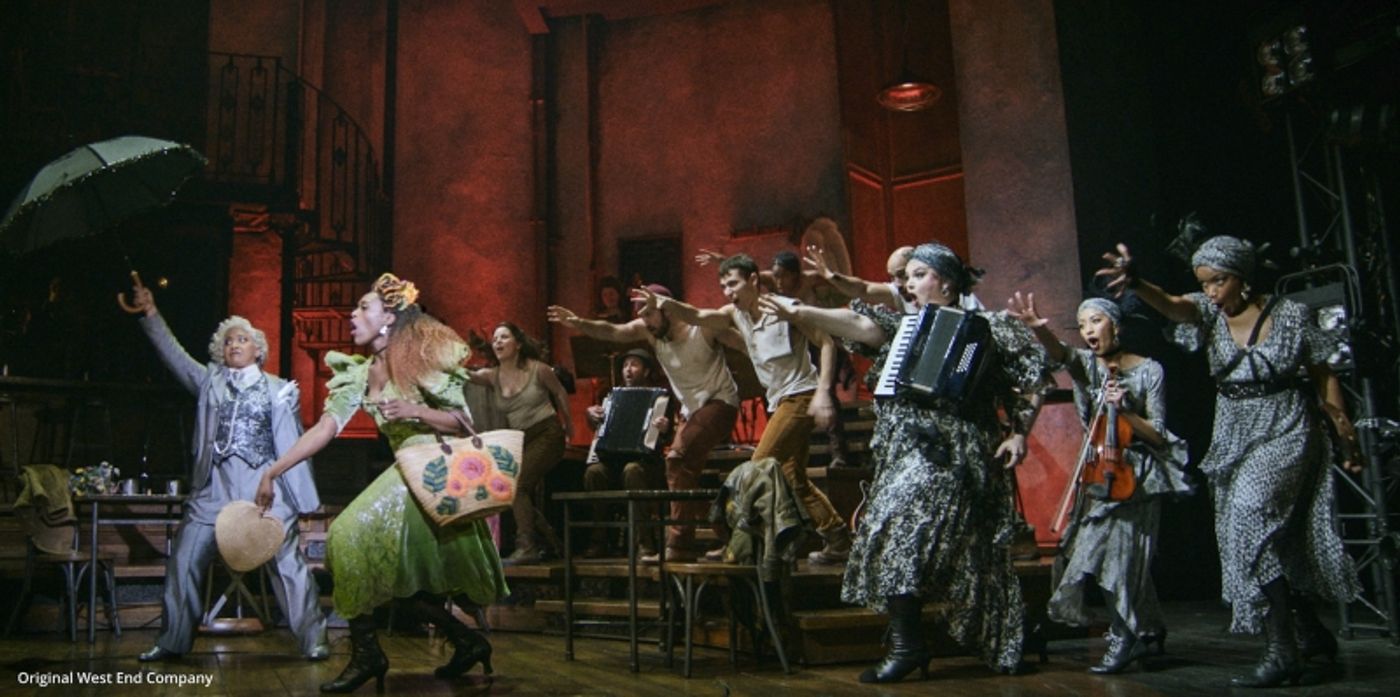Review: HADESTOWN at Segerstrom Center For The Arts
Latest national tour cast wows at Segerstrom with gritty, moody production

The opening scene of Hadestown was my favorite part: That moment when every cast member came on stage and took their places, all silent and still, as the audience held its breath and waited for the trombone’s shriek to set the show in motion.
And then, when the rhythm and brass band finally let loose with “Road to Hell,” the show’s opening song, it did so with all the raucous and infectious energy of a New Orleans music hall.
That’s all it took: We were on that “railroad line” from the first bellowing horn blow and thrumming bass note, whisked away as swiftly as Persephone leaving Spring for Hades.
And it was all about that ride.
At its heart, Hadestown — Anaïs Mitchell’s hit show, which premiered on Broadway in 2019 and won eight Tony awards, including Best Musical, Best Original Score, and Best Direction — is a retelling of the Greek myth of Orpheus and Eurydice.
In the original myth, the demigod Orpheus (the son of Apollo and the muse Calliope) falls in love with Eurydice, a wood nymph who is bitten by a snake and dies shortly after their wedding. He then travels to the underworld in an attempt to bring her back.
Things are slightly different in the musical. Orpheus is still introduced as a demigod, though this fact is largely unaddressed (besides the fact he has the uncanny ability to make magical things happen when he sings). More than anything, he’s a starving, idealistic poet and singer who falls in love with Eurydice at first sight.
Eurydice, meanwhile, is a poor, hungry girl who — after a short season of bliss with Orpheus — is lured to the underworld by Hades, who seduces her with talk of food and warmth (and, perhaps, with the lowest bass voice I’ve ever heard). Orpheus sets out to rescue her from the industrial hell below, where Hades has created a factory that’s siphoning resources from the Earth. (There’s a political statement in there, but let’s just enjoy the musical.)

Photo: Evan Zimmerman for MurphyMade, 2024.
Megan Colton, a singer/songwriter from LA, is the perfect Eurydice, with a knockout voice that’s the right kind of raspy for the soft notes and powerhouse enough for when she belts it out. She captures Eurydice’s hardened strength and her eventual vulnerability. It’s worth noting that this is Colton’s first national tour—and she’s got just a few regional theater productions under her belt— which makes me excited to see what’s next for her. It could be pop music or Broadway, and she’d do just fine.
Bryan Munar plays Orpheus, the eternal optimist who raises his glass to toast “The world we dream about, and the one we live in now” (a toast which will now be on my go-to list). Munar has an ethereal voice when he sings the high notes but an even stronger one when he keeps to the middle. At times, he seems almost too soft for Eurydice’s fierceness, but it is his sincerity that drives the story, after all, so it works.
Nickolaus Colón, who plays Hades, astounded me with the depth of his vocals. His voice plunged so low it would have been a growl if not for its sheer sultriness. I would have followed him to Hadestown, too.
South African actor Namisa Mdlalose Bizana was charming and feisty as Persephone. From my seat in the tenth row, her smile radiated across the stage, and when she sang, “Living It Up On Top,” she and the cast looked like they were having a blast. Was there really wine in those cups? I'll take some of that!
The rest of the cast — including the charismatic Hermes (played by Jaylon C. Crump) who carries the show as the narrator; and the fates, who sing their songs so perfectly in sync they sound like an instrument of their own — do a fantastic job of setting the mood. This is particularly noticeable when the ensemble marches on stage as the underworld’s soulless industrial workers, singing the “Keep Your Head Low” chant.
By the way, it has to be said that the “Why We Build the Wall” song that Hades sings to his factory minions in Act 1 has actually nothing to do with a certain U.S. president, despite the uncanny lyrics that suggest otherwise. To prove it, Mitchell told the Associated Press that she wrote the song a full decade before Trump was elected.
So, those hauntingly familiar, "We build the wall to keep us free/ The wall keeps out our enemy" lines? Not about Trump. Oh well.
That’s not to say there’s no political commentary woven into Hadestown. The show touches on themes of corporate greed (the slick, conning Hades exploiting the workers of the underworld), climate change (the harvesting of resources is making the seasons wacky, even when Persephone returns in the spring), and the polarization of hope vs apathy (Orpheus is hopeful; nobody else is).
And while the characters don’t have a lot of depth — Where did Eurydice come from, anyway? Why was she so easily lured to the underworld? Why exactly did they fall in love?— the story is easy to follow: Boy loves girl. Boy loses girl. Boy attempts to rescue girl.
[On the off chance you don’t know the myth, I won’t give away the ending, but as Hermes says in the first song, "It's a sad tale, it's a tragedy. It's a sad song," so you can take your guess on how happy the ending is.]

Photo: West End Company
With scenic design by David L. Arsenault and lighting design by Aja Jackson, the overall moodiness of the stage plays a big part in seducing the audience. The set is both a run-down tavern and underworld factory floor, with a near-constant layer of fog on the floor that sometimes extends so far out into the audience that you can smell it.
When Orpheus makes his way down to the underworld, a dance of swinging lanterns creates an otherworldly vibe that feels both haunting and beautiful. And when he escapes with Eurydice, flickering moments of light and darkness build a tangible tension as they seem to run toward hope—or fate.
In the end, Hadestown is all about seduction, and the show has all the dark, gritty sex appeal of a steamy French Quarter speakeasy. That is to say: It’s got the sultry rhythm and blues to sweep you into the fun even if you don’t know exactly why you’re there. I was as seduced as any of the characters on stage.
It’s the road to Hell, after all. And it’s all about the ride.
Reader Reviews

Videos

